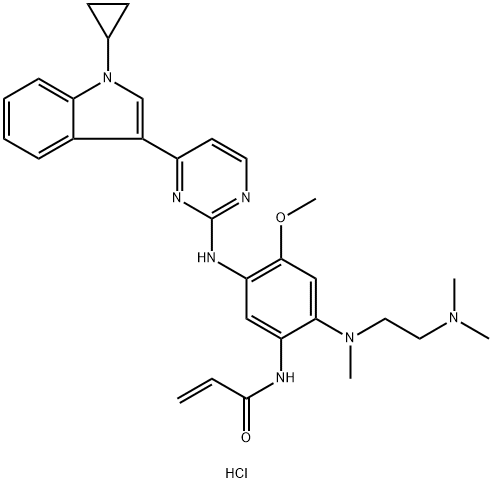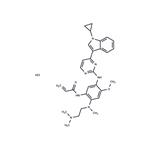HS-10296 hydrochloride is an orally available and third-Generation inhibitor of epidermal growth factor receptor (EGFR)-activating mutations and T790M-resistant mutation with limited activity against wild-type EGFR.
HS-10296 significantly inhibited the proliferation of MDA-MB-231 cells with IC50 values at 24, 48 and 72 h of 8.393, 2.777 and 2.016 μmol/L, respectively. JC-1 and flow cytometry showed that HS-10296 induced obvious apoptosis of MDA-MB-231 cells, which showed an apoptosis rate of (21.63 ± 2.97)% following treatment with 8 μmol/L HS-10296. _x000D_
_x000D_
Reference: Nan Fang Yi Ke Da Xue Xue Bao. 2020 Jul 30;40(7):981-987. https://pubmed.ncbi.nlm.nih.gov/32895156/
Western blotting showed that compared with the control group, the expression levels of MMP-9, MMP-2 and vimentin protein in PC-9 and H1975 cells in 1, 2 and 4 μmol/L almonertinib treatment group were significantly lower, and the expression level of E-cadherin protein was significantly higher (all P<0.05). The experimental results of nude mice showed that compared with the control group and the positive control ositinib (AZD9291) group, the tumor growth was significantly inhibited, the weight of nude mice, the tumor volume and the tumor mass were significantly reduced in the almonertinib treatment group (all P<0.05)._x000D_
_x000D_
Reference: Zhong Nan Da Xue Xue Bao Yi Xue Ban. 2021 Oct 28;46(10):1045-1053. https://pubmed.ncbi.nlm.nih.gov/34911833/
Almonertinib (HS-10296) hydrochloride is an orally available, irreversible, third-generation EGFR tyrosine kinase inhibitor with high selectivity for EGFR-sensitizing and T790M resistance mutations. Almonertinib hydrochloride shows great inhibitory activity against T790M, T790M/L858R and T790M/Del19 (IC50: 0.37, 0.29 and 0.21 nM, respectively), and is less effective against wild type (3.39 nM).

